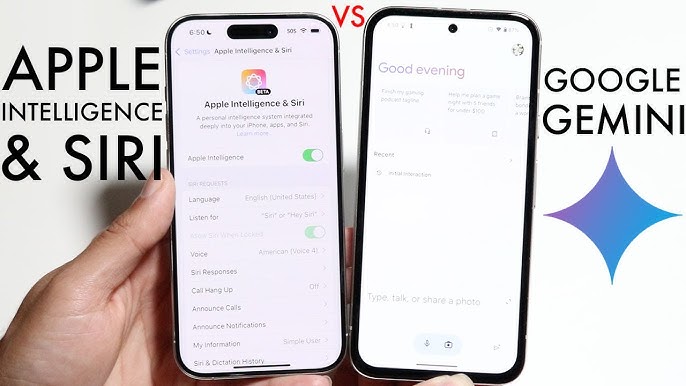Apple Intelligence vs Gemini AI: Which Smartphone Assistant is Smarter?
Artificial intelligence has transformed the way we interact with smartphones, and in 2025, Apple Intelligence and Google Gemini are leading the charge. Both AI assistants aim to simplify tasks, enhance productivity, and deliver personalized experiences, but they approach these goals differently. In this article, we’ll compare Apple Intelligence and Gemini AI across various aspects to determine which one is smarter and better suited for your needs.

The Rise of AI in Smartphones
AI assistants have become integral to modern smartphones, offering capabilities such as voice commands, smart searches, task automation, and more. Apple Intelligence was launched in 2024 as Apple’s proprietary AI system integrated into iPhones, iPads, and Macs. Meanwhile, Google Gemini debuted in late 2023 as an evolution of Google Bard, designed to work seamlessly across Android devices and Google’s ecosystem.
Both systems aim to redefine how users interact with their devices by leveraging generative AI models and advanced algorithms.
Key Features of Apple Intelligence
Apple Intelligence focuses on delivering a seamless experience within the Apple ecosystem:
- On-Device Processing: Apple prioritizes privacy by performing most AI computations locally rather than relying on cloud servers.
- Enhanced Siri: Siri has been upgraded with ChatGPT integration for smarter responses and cross-app functionality.
- Image Recognition: The system can identify objects, animals, plants, and text within images using advanced visual AI.
- Call Recording and Summaries: Users can record calls (with consent) and receive concise summaries for later reference.
- Private Cloud Compute: Secure cloud processing for tasks requiring additional computational power.
Apple Intelligence is deeply integrated into iOS devices running A17 Pro chips or newer models.
Key Features of Google Gemini
Google Gemini offers a more flexible approach to AI capabilities:
- Multi-Modal Understanding: Gemini can process text, audio, images, video, and code seamlessly.
- Personalized Tutoring: The assistant acts as a digital teammate for learning new skills or managing tasks efficiently.
- Magic Eraser for Photos: Advanced photo editing tools like Unblur and Cinematic Photos enhance visual content.
- Integration with Google Apps: Gemini works seamlessly with Gmail, Google Calendar, Docs, and other services for productivity.
- Wide Availability: Compatible with most Android devices and Chromebooks across multiple regions.
The system leverages cloud-based processing to deliver powerful results but requires an internet connection for optimal performance.
User Experience: Which Assistant Feels Smarter?
The user experience of these assistants depends on their integration with devices and ecosystems:
- Apple Intelligence: Offers a seamless experience within the Apple ecosystem. For example, users can ask Siri to find conversations across apps like Messages or Mail. Its local processing ensures faster responses without compromising privacy.
- Gemini AI: Excels in handling complex queries involving multiple types of media. Its ability to connect dots across Google apps makes it a powerful tool for productivity. However, its reliance on cloud processing may result in slower responses in offline scenarios.
If you’re deeply invested in either ecosystem—Apple or Google—the respective assistant will feel more intuitive based on its integration with your daily workflows.
Cognitive Abilities: How They Handle Complex Tasks
The cognitive abilities of these AI systems are tested through their handling of complex queries:
- Siri (Apple Intelligence): Can draft professional emails using ChatGPT integration or summarize lengthy calls into concise notes. It excels in context-aware actions within apps but struggles with multi-modal queries involving images or videos.
- Gemini AI: Handles multi-part requests effortlessly. For example, users can ask it to analyze an image while generating related text-based insights. Its ability to combine information from various formats gives it an edge in versatility.
If your tasks involve diverse media types or intricate workflows, Gemini may outperform Siri in terms of cognitive flexibility.
Privacy and Security
The privacy policies of these assistants reflect their parent companies’ philosophies:
- Apple Intelligence: Performs most computations locally on the device to minimize data exposure. Its Private Cloud Compute feature ensures secure handling of sensitive tasks requiring cloud resources.
- Gemini AI: Relies heavily on cloud processing but employs strong encryption measures to protect user data during transmission and storage.
If privacy is your top concern, Apple Intelligence offers a more secure approach by limiting reliance on external servers.
Ecosystem Integration
The effectiveness of these assistants also depends on their integration within their respective ecosystems:
- Siri (Apple Intelligence): Works seamlessly across iPhones, iPads, Macs, Apple Watches, and Apple TVs. Its ability to perform cross-app actions enhances productivity for users deeply invested in Apple’s ecosystem.
- Gemini AI: Integrates well with Android devices as well as Google apps like Gmail, Calendar, Drive, and Docs. Its wide compatibility makes it accessible to users across different platforms.
Your choice between these assistants may depend on whether you prefer Apple’s closed ecosystem or Google’s open-source flexibility.
The Verdict: Which Assistant Is Smarter?
The answer depends largely on your priorities:
- If you value privacy and seamless integration within the Apple ecosystem: Choose Apple Intelligence for its local processing capabilities and enhanced Siri functionality.
- If you need versatility across media types or rely heavily on Google apps for productivity: Opt for Gemini AI for its multi-modal understanding and broader compatibility.
Both assistants are incredibly capable but cater to different user needs based on their design philosophies and ecosystem integrations.

